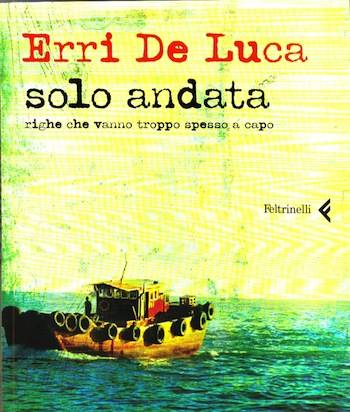Tackling the Issue of Immigrantion with Canzoniere Grecanico Salentino
Set to text by Neapolitan author Erri de Luca, and directed by actor and director Alessandro Gassmann, "Solo Andata" (One Way Ticket) is the latest video, for the song by the same title, by Canzoniere Grecanico Salentino, Italy's leading band on the world music scene. "Solo Andata" is the first single from the group’s album Quaranta (40) which celebrates 40 years of activity.
The video addresses the ongoing issue of immigrants arriving from North Africa to Italy's shores. The setting is in Sbiaggiabella, in the province of Lecce, Puglia, we see an old man, portrayed by Manrico Gammarota, is going fishing in an area marked by a NO FISHING sign.
From the dark and agitated sea, he sees emerge between the waves the figures of some migrants, who, with anxious strokes, reach the shore. The desperation of the shipwrecked reminds the fisherman of his mother, an immigrant herself.
Her appearance, first in a photograph and then “in person,” brings forth an imaginary bridge between past and present, a present similar to the past where the others were not welcome but there were always people able to see their humanity and helping out.
At the end of Canzoniere Grecanico Salentino’s song we see Erri De Luca himself, looking straight at us, in in voice over we hear his words. “Embraced by the Mediterranean, migrants from Africa and the East sink into the hollow between waves. The sack of seeds brought from home goes scattered through seaweed and hair. Dry land in Italy is a land locked down. We let them drown to drown them out.”
Every day hundreds of migrants, the ones who make it to shore, seek refuge in Italy. On a daily basis we hear news similar to this one: at least ten victims of a shipwreck were found 40 miles from the Libyan coast… all the others, who knows how many, are lost at sea. A boat full of migrants has capsized and sunk.
The night before a couple hundreds reached the shore: a few were sent to the hospital while the rest were transferred to the nearest city’s sport facility. Some are trying to reach another destination, some just want to stay.
“In Italy, the doors are closed to migrants,” Erri De Luca has said in the past, “People know who these others are: they’re new citizens who have come here to give a jolt to a society that is tired and old.” But not everybody sees it that way, and Canzoniere Grecanico Salentino wanted to share their vision.
i-Italy had the chance to ask Mauro Durante, the group’s leader and offspring of CGS's founding members, a few questions.
Currently, how’s the migration issue viewed in Italy?
There is a heated debate on the subject. Unfortunately some politicians are trying to feed on the fear of the moment, sending out messages that are xenophobic and racist. There is no space for questions of color or political affiliation, this issue is one of the greatest tragedies of history… regardless. These people should be helped, by the entire European community, that’s what it exists for, otherwise this “community” is false and useless.
Can you tell us more on Solo Andata? How was this song conceived and how did you decide to collaborate with De Luca?
"Solo Andata" is the story of many meetings. The idea was of the pugliese journalist Gabriella Della Monaca, following the meeting of my father Daniele with Erri De Luca. We planned to set Erri’s poem, taken from his book Solo Andata, to music: consequently we met with the Canzoniere, Alessandro Gassmann and Amnesty International. Everybody joined in with enthusiasm and faith, as this project wants to give human dignity back to all migrants. It’s our way to say “Stop Indifference.”
Who’s different is seen as the enemy. How do you address this with music?
Both music and dance, but dance most of all, have the power to eliminate distances. Through the symbolism of dance we want to convey our effort to recover a strong spirit of solidarity and community. In dance there is no difference in age, social class, race, sex; we all are in the same condition, with our feet on the ground, looking at each other as we “touch.” We must rediscover the importance of real contact.
Solo Andata has already earned Amnesty International Italy's 2014 Arts and Human Rights Award Riccardo Noury of Amnesty International Italia called it an “extraordinary piece, it talks about immigrants and refugees trying to give them back some dignity, rights, humanity that are taken away by those who see them as a problem, a number, a menace and a danger.”









































i-Italy
Facebook
Google+
This work may not be reproduced, in whole or in part, without prior written permission.
Questo lavoro non può essere riprodotto, in tutto o in parte, senza permesso scritto.